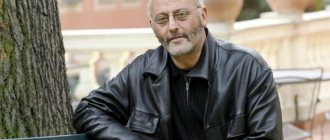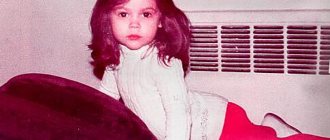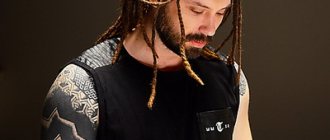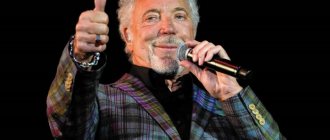Origin
The future president of France was born in the city of Paris on January 28, 1955, in the family of a native of Budapest, Pal Nagy-Bocsa Sarkesi, and a Frenchwoman, Andre Malla. My father came from an old Hungarian dynasty who fled to the West in 1944 after Soviet troops entered the country. His relatives, who once owned the castle and are large Hungarian landowners, were supporters of the pro-fascist Horthy regime.
In Baden-Baden, under the name of Paul Sarkozy (rewriting his surname in the French way), he signed up for the French Foreign Legion. In 1948, he was demobilized, having served a five-year contract in Algeria and not wanting to go to fight in French Indochina.
Having received French citizenship for his service, he settled in Marseille. Later he moved to Paris, where he met a pretty Parisian student, who soon became his wife. Andre studied at the Faculty of Law and was the daughter of a famous surgeon in the area. Her father was an emigrant from the Greek city of Thessaloniki, a Sephardic Jew who converted to Catholicism. Mom, also of the Catholic faith, was French. It was she who gave Nicolas Sarkozy a quarter of his French roots.
Childhood and the beginning of the biography of Nicolas Sarkozy
The future President of France and Prince of Andorra was born on January 28, 1955 in the city of Paris. His family had not only French, but also Hungarian and Jewish roots. The father of our today's hero, a native of Budapest, Pal Nagy-Bocsa Szarközy, was a representative of a well-known noble dynasty in Hungary and even owned his own castle. During World War II, he, like many other large landowners, supported the pro-fascist regime in Hungary, and therefore was forced to flee the country after the arrival of Soviet troops and the establishment of a socialist regime in the country. So, the father of the future president ended up in France. Here he met a charming student named Andre Mala, who very soon became his wife. As a result of this union, three sons were born, among whom Nicolas was the second oldest.
Nicolas Sarkozy - former flamboyant president of France
It is quite remarkable that in childhood the Sarkozy family lived quite poorly. After the birth of the children, the father of our today's hero left the family and practically did not help his children in any way. That is why Nicolas often felt superfluous and unnecessary in the world that surrounded him. He often suffered attacks from his classmates, who always did not treat the descendants of emigrants very well. In later interviews, Nicolas Sarkozy repeatedly admitted that his desire for power was largely based on his second-class status as a child.
In 1978, the future president of France graduated from the University of Paris X-Nanterre, where he received a master's degree in civil law. After this, he also studied for some time at the Institute of Political Studies, but left it without receiving a diploma. For some time after this, our today's hero worked in the field of commercial law, specializing mainly in issues related to real estate.
early years
The boy was raised by his grandfather, who was an ardent Gaullist. Nicolas studied at a Catholic school, and rather mediocrely. The father appeared occasionally, scolded his son, and disappeared again. He did not provide any financial support to the family. As a child, as Nicolas Sarkozy later recalled, he did not feel like a full-fledged Frenchman and suffered due to a relatively poor financial situation. After the death of their grandfather, they moved to Neuilly-sur-Seine, a town near Paris.
In 1973, Nicolas graduated from school and entered the University of Paris X-Nanterre, from which he graduated in 1978, becoming a master in civil law. He continued his education at the Institute of Political Studies, but before finishing his studies, he began his career as a lawyer in the field of real estate.
French President's wife Cecilia Sarkozy: "I'm politically incorrect"
A story with a happy ending is quite a rarity in world news. Such a pleasant exception was the release of five Bulgarian nurses and a Palestinian doctor from Libyan captivity. Their hugs with their families and tears of joy at Sofia airport were broadcast by all major TV channels. Of course, after good news - traditionally - the press will begin to look for scandalous details of this case. First of all, ask the question: “Which country’s taxpayers paid for the freedom of the Bulgarians?” But all this will happen later. In the meantime, the relatives of the former captives are watching the speech of French President Nicolas Sarkozy on TV and thanking him for his help. They also thank his wife Cecilia, who used all her feminine charm to save people. “I don’t see myself as the first lady.” This very idea makes me sad. After all, I prefer hiking pants and cowboy boots and don’t fit the generally accepted mold at all: I’m “politically incorrect,” Cecilia admitted two years ago in an interview with Paris Match. Either Madame Sarkozy was disingenuous, or she really believed in what she said, but she did not keep her word. She actively participated in her husband’s election campaign, accompanying him on trips around the country and posing in front of cameras. And during the first round, she came with her whole family to the ballot boxes. But her political fervor was not enough for the second round - Sarko had to vote alone. “Not a drop of French blood” The mistress of the Elysee Palace once admitted that she “doesn’t have a drop of French blood.” And this is absolutely true. The wife of the French president could be a citizen of the world, which she is trying to become by rescuing Bulgarian women and a Palestinian from Libyan captivity. Her father Andre Ciganer (born Aron Chuganov) is half Romanian Gypsy and half Odessa Jew. And mother Teresita Albeniz de Swert is half-Belgian, half-Spanish. Cecilia's grandfather played football for Real Madrid before pursuing a diplomatic career. This was at the very beginning of the twentieth century. As a child, Cecilia had heart problems, which delayed her physical development. At 12, she looked seven. At 13 she underwent a major operation. After studying at the conservatory and religious school, Cecilia entered the Faculty of Law at the University of Paris. Like all students, she worked part-time as both a model and a PR woman. But she never made a career, preferring marriage. The first chosen one of 27-year-old Cecilia was 51-year-old TV presenter of children's programs Jacques Martin. They decided to have the wedding in the Parisian suburb of Neuilly-sur-Seine. The ceremony was led by the mayor of the city, 29-year-old Nicolas Sarkozy. As he later assured, he “fell in love with the bride right during the wedding” and for 12 years, until the official registration of their marriage in 1996, he tried to win her. True, unrequited love did not prevent the future president from marrying someone else. Cecilia divorced her first husband in 1989; Sarko lasted seven years longer. They had their wedding in the same place where they met - in Neuilly. Between them, Sarko and Cecilia have five children - two each from their first marriages and a 10-year-old son, Louis. Why Nicolas got mad at the Paris Match But even in this marriage there was no complete idyll. Cecilia (by this time she was working as an adviser to her husband, the head of the Ministry of Internal Affairs) at some point could not stand Sarko’s character and ran away from him to the American advertiser Richard Attias. Photos of the lovers taken in New York were published by Paris Match, for which its editor-in-chief Alain Genester was fired. Fortunately, Sarko has plenty of friends in the media business. Since then, Paris Match prefers not to get involved with Sarkozy, printing exclusively “correct” photographs: Madame and Monsieur Sarkozy walking around London in an embrace, Cecilia standing on the Place de la Concorde behind her husband on the day of his victory in the elections on May 6... But then, two years ago, the wounded head of the Ministry of Internal Affairs also started an affair on the side. The “love triangle” turned into a square: the fourth person involved was Le Figaro journalist Ann Fulda. Sarkozy's new passion left the stage of this soap opera quite quickly: literally a few months later, after taking a good rest from each other, the married couple reunited. And since then we haven’t left each other. Although evil tongues claimed: at the most inopportune moment, in the midst of the election campaign, a new crisis broke out. It was not for nothing that Cecilia did not come to vote for Sarko in the decisive second round, which he could have lost to the mother of many children, Segolene Royal. 400 euros is not a reason for controversy Before Cecilia had time to move to the Elysee Palace, several scandals erupted around her name. To begin with, Madame Sarkozy was accused of embezzlement of public funds. We were talking about the amount of 400 (!) euros, which she used to pay with a credit card for a couple of lunches at work. The First Lady did not contact the “well-wishers”, but simply returned the government card. And since then she has been paying for everything herself. The second story is related to the renovation she started at the Lantern presidential residence, located near Versailles. During an unscheduled police check, it turned out that two builders hired by Cecilia, natives of Mali, did not have permission to work in France. Madame Sarkozy immediately remembered her husband’s promises to “resolve the issue with immigrants” and asked for clarification. However, after the victory of the first lady over the Libyan justice system, hardly anyone will remember these scandals. Cecilia (by the way, by her own admission, she went to Tripoli “not as an official, but as a mother”) is already being compared to Lady Diana. She was also ready to shoulder almost all the world’s problems. There will be enough such problems for Cecilia's lifetime. And hostages in Afghanistan, and “ethnic cleansing” in Darfur, and Kurds and Palestinians who cannot create their own states. There are many issues in the world that politicians cannot resolve for years. So Cecilia Sarkozy will have plenty to do.
There would be enough desire and energy. Conversation with Putin
At the G8 summit in Heiligendamm, Germany, the first international “presentation” of President Sarkozy, Cecilia decided to behave differently from everyone else. Even if it was a well-prepared improvisation, it still looked impressive: before the start of the official meeting with Vladimir Putin, Nicolas Sarkozy’s mobile phone rang. But these were not urgent matters of paramount importance - his wife decided to talk to him. Until now, such a situation - a call from relatives during a business meeting - was unthinkable among high-ranking statesmen. After chatting with Cecilia, Sarkozy handed the phone to Putin so that he could hear his wife. As it turned out, Lyudmila Putina was next to the wife of the French president at that moment. Who immediately invited Cecilia to come to Sochi one day - with or without her husband. And then Cecilia upped and left the summit without waiting for it to end. She did not publicly explain the reasons for her departure, which is why commentators immediately decided: this is the beginning of a rebellion against the usual role of the first lady, who is obliged to obey strict protocol rules, smile at events that do not interest her and always stay in the shadow of her husband. Europeans were offended by the treacherous Frenchwoman
German media and German Foreign Minister Frank-Walter Steinmeier sharply criticized the role of official Paris and the Sarkozy couple in the “nurses' case.” In their opinion, France appropriated political and economic dividends from the release of Bulgarian nurses and a Palestinian doctor, whom Tripoli accused of deliberately infecting hundreds of children with AIDS. The Germans remind with resentment that all negotiations on this issue were conducted by representatives of Germany during its presidency of the EU. The intelligence services of almost twenty countries were involved in contacts with the Libyans. The negotiations were conducted using the method of “quiet” diplomacy - EU emissaries used the slightest opportunities to achieve success. But then, without agreement with Brussels, Cecilia Sarkozy appeared in Tripoli. And it was she who was immediately declared “triumphant” by Paris. Through the mouth of her husband Nicolas, who said: “Cecilia showed remarkable courage, humanism, foresight and brilliantly solved a complex international problem.” The EU headquarters did not hide their irritation. And Portuguese Foreign Minister Luis Amado generally stated that liberation would have been achieved with “less bloodshed” and earlier, if not for the intervention of the Sarkozy couple.
As mayor
Nicolas Sarkozy became involved in politics early. In 1976, he joined the new Gaullist party, the Rally for the Republic (ROR), which was founded by the future president Jacques Chirac. He was recommended by the famous French politician Charles Pascua. A year later, from this party he became a member of the city council of Neuilly-sur-Seine, the western outskirts of Paris. And when he turned 28, in 1983 he became the mayor of this city and remained in this post until 2002.
He performed well during the campaign for the 1981 presidential elections, when he worked in Jacques Chirac's youth committee. The young and energetic young man was noticed and began to be promoted into big politics; in 1988 he became a deputy of the Lower House of Parliament. The first photos of Nicolas Sarkozy with leading French politicians appeared in the press of those years.
From 1993 to 1995, he served as Minister of Budget and then as Minister of Communications in the government of Edouard Balladur.
[edit] Political career
FFFFFUUUUUU
In 1974 he joined the Union of Democrats for the Republic (de Gaulle's party). At the age of 28, he became mayor of his hometown Neuilly-sur-Seine and retained this post until 2002. In 1993, he became famous for personally negotiating with a terrorist who took children hostage in a kindergarten in this city. At the same time he entered the government under President Chirac. After 2 years, he betrayed him and defected to a rival who had a higher rating before the elections. But after the “Vote or lose” campaign, Chirac won a majority of votes and took the presidency, after which he dispersed the traitors. Two years later, Sarkozy repented and became a deputy again. In 1999 he was a member of the European Parliament. In the 2002 elections, he supported Chirac and became Minister of the Interior, and in the summer of 2005 he rose to the rank of Minister of State (Deputy Prime Minister).
From January to May 2007, he won the presidential elections in two rounds. After ascending to the pinnacle of power, he lowered himself in the eyes of the Franks and (especially) the French chocks. I ran for a second term, but it didn’t work out. Goodnight, sweet prince.
[edit] After the ball
When the presidential mandate passed into the hands of a socialist successor, Nicolas dematerialized from the foreground of public life to such an extent that when mask shows visited his home and office in July 2012, he himself was not noticed in the media. Journalists even began to wonder whether he still existed as such, and then they simply forgot about the old man. But after resting and gaining strength, he again began to emerge in the chronicle.
Following in the footsteps of Pancake Clinton, Nicola plans to travel with lectures around the world and collect money for his foundation, the purpose of which is to support democracy around the world. November was marked by a trip to visit Solntse-Face and a demonstrative conversation on a first-name basis.
During the unprecedented squabble that erupted around the calculation of the election results for the head of the Union for the Popular Movement party, Nicolas could not resist the temptation to act as a peacemaker, but his plan lasted less than his participation in enforcing peace in August 2008.
Since the spring of 2013, against the backdrop of increasing failures on Hollande’s part, Nicolas began regularly throwing hints into the press about his return to politics. When journalists suddenly ask, “What about the elections in 2017?”, Sarko proudly raises his head and answers every time: “Unfortunately, the question will not be “do you want to return?”, but “is there a choice?” ?“ I will be obliged to return. Not because I want to. But because I have to." After this, the henchmen of the party, of which he is not a member, abruptly forget about the internal squabble and sing in unison: “If not, then who?!”
Minister
Nicolas Sarkozy showed himself especially clearly as Minister of the Interior, Internal Security and Local Government in 2002-2004. At this time, France was overwhelmed by a wave of crime, problems associated with tensions in the large Muslim community were growing, and aggressive anti-Semitism was flourishing. The situation in Corsica with its traditional separatism has worsened. In 2002 alone, more than 200 terrorist attacks occurred on the island.
The reforms and their harsh administration caused strong discontent in liberal circles, who accused the ministry of infringing on civil liberties. Measures to strengthen the fight against crime included expanding the powers granted to law enforcement forces and a widespread police presence on the streets. Tighter controls on streets and roads have reduced the number of accidents. There was a systematic fight against illegal immigration and prostitution.
His success as a minister was appreciated, and in May 2004 he was appointed minister of state, the second most important post in the government. In 2007, he resigned as preparations for the presidential elections began.
At the pinnacle of power
In the second round of elections, Sarkozy defeated socialist Ségolène Royal, gaining 53% of the vote. After becoming President of France, Nicolas Sarkozy began large-scale reforms. First of all, the changes concerned the basic law of the country. Many changes were made regarding the activities of the president, including restrictions on the re-election of the head of state. Parliament is given the right to veto presidential candidates. Other reforms, for example, an increase in the presidential salary by 140% with a simultaneous reduction in taxes on it, caused an extremely sharp reaction in society, where they had previously been quite critical of it.
The actions of President Nicolas Sarkozy to strengthen European integration, stabilize and increase the efficiency of the financial system of the European Union have received international recognition. He advocated strengthening the influence of the European Union on world politics and was opposed to Turkey's admission to this organization.
Nicolas Sarkozy (France was the EU chairman at that time), representing not only his country, but also Europe as a whole, made a significant contribution to the settlement of the military conflict in South Ossetia.
Sarkozy married a catwoman
French President Nicolas Sarkozy and his fiancee Carla Bruni secretly got married - French newspapers were the first to report this sensational news. Rumors about the upcoming wedding and even about the “interesting situation” of the 40-year-old ex-model have been circulating for a long time, and even the wedding date was named - February 9. The President, apparently, decided to give the world a surprise and got married in secret. By the way, there is no law obliging the head of the republic to report changes in his marital status, which means his opponents have nothing to accuse Sarkozy of. Is it just to envy...
And one simply cannot help but envy President Sarkozy. The future first lady of France, Carla Bruni, is not only beautiful, but also incredibly smart. Shrewd and unenvious observers are already predicting that Carla's accession to the Elysee Palace will be similar to Jacqueline Kennedy's accession to the White House. That Carla, like Jacqueline, will turn the presidential residence into a fairy-tale Camelot castle. She has already turned the salon of the Elysee Palace into a “pop music recording room,” the tabloids say sarcastically, hinting at Carla’s pop career in the 90s.
Envious people denigrate the beauty. As soon as they curse her: a homewrecker, a heartbreaker, a mousetrap for men, a hunter of rock idols, an empty-headed fashion model, a photogenic scarecrow and a number of epithets that, due to their obscenity, cannot be reproduced in a newspaper.
And yet, President Sarkozy should not be sympathized with, but envied. Carla Bruni is not ballast, but an enviable match, especially for the head of state. She is not only a great lover, but also a first-class future first lady who you can be proud of, not ashamed of, not hide at home, but flaunt. Only an extraordinary woman is taken to the Egyptian pyramids, which were “visited” by Napoleon Bonaparte himself. Only an extraordinary woman could become the muse of the great rock singers - Eric Clapton and Mick Jagger. Only an extraordinary woman could make two outstanding philosophers fall in love with her - Enthoven the father and Enthoven the son. And only an extraordinary woman can raise Sarkozy's declining ratings.
According to the worn-out cliché, if you are a model, you are a fool and a mongrel who was picked up in the alley and made into an attractive mannequin for displaying clothes. If you are a model, you are a doll and know your place. Karla was not born in a gateway, but in luxury. Carla's family moved from Italy to France in the 70s because her parents were afraid that the mafia might kidnap their daughter for ransom. Her stepfather is Alberto Bruni Tedeschi, the Italian king of car tires and part-time... a composer who writes classical music. Her mother, Marisa Borini, is a famous concert pianist. Carla is rich and brilliantly educated. She is fluent in French, Italian and English.
In the 90s, Carla was a top model for the houses of Dior and Chanel. 250 times her photo graced the covers of magazines! After leaving the podium, Karla followed in the footsteps of her parents - she began to compose and perform music. Her first album was released in 2003 and immediately became a bestseller. The chanson song “Someone Told Me” sold a million copies in France and half a million copies abroad. In 2004, she was even awarded the French equivalent of a Grammy Award for Best Female Singer.
Carla is accused of loving “cat fights.” Naturally, for a standing cat. Yes, she loves them and comes out of them not as a skinned cat, but as an Angora cat, that is, a winner. What's bad about it? Moreover, the winners are not judged. People gossip about them. Enviously. Carla does not hide the fact that she is a cat: she recently described herself as such in an interview with a French magazine - and, moreover, “a tamer of obstinate men.” Sarkozy quickly tamed Karla. Three months after their first dinner, a pink diamond engagement ring sparkled on Carla's finger. The ring was the work of Dior designer Victoire de Castellane.
Actually, Carla is more of a tigress than a cat. “She rushes at her prey with lightning speed,” says the editor of a French fashion magazine, but she speaks anonymously, not wanting to try Madame Bruni’s claws on herself.
Writer Justine Levy, ex-wife of the famous philosopher Raphael Enthoven, experienced the power of these claws. Carla fell in love with Raphael and took him away from Justine. And before that, she had a stormy affair with his father Jean-Paul Enthoven - by the way, also a philosopher. But again, note: while Princess Diana was fond of playboys and cavalry officers, not to mention secret service officers, Carla preferred philosophy. Ms. Levy wrote a novel whose main character is based on Carla. “She was a beautiful and bionic woman with the look of a killer,” Levy writes. She gives her heroine the nickname Terminator...
It is curious that the former first lady of France, Cecilia, is cut from the same cloth as Carla, only she is ten years older than her lucky rival. Cecilia, like Carla, is beautiful and smart, was a fashion model (worked for the Schiaparelli company) and had composer ancestors. One of the witnesses to her marriage to Sarkozy was the pillar of the “dolce vita” industry, Bernard Arnault, chairman of the board of directors of LVMH (Louis Viutton Moet Henessy). Cecilia, like Carla, has been compared to Jacqueline Kennedy. And yet, neither Cecilia nor Carla believe in the sanctity of marriage under the shadow of the Roman Catholic Church. Cecilia was nine months pregnant (with her first husband, Jacques Martin) when she began having an affair with Sarkozy.
Carla, in turn, proclaims: “Love can last for many years, but burning sexual desire only lasts two or three weeks.” Carla “is sometimes monogamous,” but, as she told Le Figaro Madame magazine, “I prefer polygamy and polyandry,” that is, plurality and polyandry. For her, this is “the ideal lifestyle of naturally, genetically and materially rich people who want to get more from life than the average peasant should.”
Long Nguyen, publisher of Flaunt magazine, which recently published a centerfold of Carla Bruni, says: “People have never loved the rich and beautiful, some openly, others deep down. Some admit it, others don't. People would sooner consider some former alcoholic or drug addict worthy of the role of first lady, even if she were ugly and poor. The point in the case of Carla is not that she is an ex-model, and therefore is not suitable to be the first lady, but that she has everything...”
MEANWHILE
Police detained two people who threatened Sarkozy's 10-year-old son Louis over the phone. They turned out to be a 22-year-old telephone company employee and a 21-year-old fire rescuer, who, having gained access to the list of VIP mobile communications clients, called the president’s youngest son and threatened him with violence.
After the presidency
In 2012, President Nicolas Sarkozy lost in the second round of elections to socialist Francois Hollande, the ex-husband of Ségolène Royal. It is interesting that it was from her that Sarkozy, in turn, won the second round of the previous presidential elections. After the defeat, he returned to practice law in his law firm, which he founded back in the 80s. Then Sarkozy said that he would never engage in politics again.
However, in September 2014, he officially announced his return to the political arena. According to all ratings, Sarkozy was in the lead among right-wing voters. However, in the primaries for the 2020 presidential election, he took only third place and dropped out of the race.
[edit] Sarkozy's loss in the 2012 presidential election
Nicolas Sarkozy took part in the 2012 presidential elections. His main rival was the socialist Francois Hollande.
On April 22, 2012, the first round of the presidential elections took place, in which Sarkozy lost with 27.18%. Hollande scored 28.63.
On May 6, 2012, the second round took place, during which Hollande won with 51.64% of the votes. Sarkozy scored 48.36%.
On May 15, 2012, the elected President of France, François Hollande, took office as President of France.
Parliamentary elections were held on June 10 and 17, 2012, which the Socialists also won.
Libyan revenge
Former French President Nicolas Sarkozy was detained by police on March 20, 2020 in connection with a corruption investigation. The main accusation concerned receiving funds for his 2007 election campaign from Libyan leader Muammar Gaddafi. This is the first time a former head of state has been detained. French law prohibits the financing of election funds from foreign sources.
The investigation into possible financing of Sarkozy's election campaign by the Libyan authorities began in April 2013. In 2011, the son of the murdered Gaddafi, the leader of the Jamahiriya, said that his father sponsored the election fund, transferring more than 50 million euros. The following year, Mediapart published documents confirming these transactions, which Sarkozy called fake.
Stormy personal life
Quite little is known about life with his first wife; they got married in 1982. His chosen one was a girl from a small village from Corsica - Dominique Cuglioli, who worked as a pharmacist. The Corsican gave birth to two sons: Pierre (1985) and Jean (1987).
In 1984, he met Cecilia Cigane-Albenitz, and at her wedding. Sarkozy, as mayor of the small town of Neuilly-sur-Seine, attended the registration ceremony at the municipality. The bride, already pregnant, married the owner of a local television channel, Jacques Martin. All this did not stop Nicolas from falling in love with Celia. Their romance lasted 12 years, during which time Madame Martin gave birth to two daughters from her husband. For one of the daughters, Nicolas Sarkozy's wife became godmother.
Nicolas Sarkozy, wife
The former president of France, at the beginning of his reign, surprised his compatriots with actions that were not typical for the first person of the state - divorcing his first wife and marrying his second. first wife Cecilia Attias was only recently able to forgive her rival Carla Bruni, and it is unknown whether this forgiveness is sincere.
The second wife of the former president of France was used to getting everything she wanted from life - Carla was from a wealthy aristocratic family, and she always had everything she could wish for, and Carla always knew what she wanted.
In the photo - Nicolas Sarkozy and Cecilia Martin
Among her suitors were only rich and successful men, and the marriage with Sarkozy became so rapid and coincided with the moment he assumed the presidency that many immediately began to suspect the purity of her thoughts.
Nicolas Sarkozy's second wife met him in 2007, when he was still married to Cecilia. The future president did not hide from his wife that he fell in love with someone else and was going to start a new family with her.
In the photo - the second wife of Nicolas Sarkozy
After the divorce, Cecilia Attias, along with her children - two daughters from her previous marriage and the son Louis she shared with Nicolas, went to New York so that she would not be pestered by journalists. There she married advertising director Richard Attias, who had long been her lover.
Cecilia was not Sarkozy’s first wife - before that, for a year and a half, he had been married to the Corsican Marie-Dominique Cuglioli, who gave birth to two sons, Jean and Pierre. He left her for model Cecilia Martin, who at that time was also married to an elderly entrepreneur. The marriage with Cecilia did not last a full three years and broke up due to the president’s new love.
Nicolas Sarkozy's third wife, Carla Bruni, was educated at a Swiss school, where she took piano and guitar lessons. While still in school, she began trying out as a model, and after school she entered the Faculty of Art History at the Sorbonne. But the modeling business crowded out everything else from Carla’s life, and she, having dropped out of university, devoted herself entirely to working as a model, becoming one of the highest paid in the world.
Having completed her career on the eve of her thirtieth birthday, Carla tried her hand as a singer and even recorded a solo album, which was a huge success in France. Later, several more albums were released, songs for which were written by Bruni herself. She continued her solo career, already becoming the first lady of France. Also interesting: Vyacheslav Tikhonov, wife and Daniel Radcliffe, wife
Second marriage
The old lovers got married in 1996, and a year later their son Louis was born. However, over time, reports began to appear in the yellow press that a crisis had arisen in the family relations of a high-ranking official. In 2005, the famous Paris Match magazine published photographs of Cecilia and her alleged lover, businessman of Moroccan origin Richard Attias, whom she married after her divorce from Sarkozy.
They were planning to separate at the beginning of 2007, but decided to wait due to the beginning of the presidential campaign. However, already in October there was a message about the divorce by mutual consent.
[edit] "Sarkozy was there"
Somehow it turned out that in addition to everything, Sarkozy also managed to become an Internet meme. And all because of a brazen and, as it turned out, rather stupid PR stunt. Since every great personality (and all dwarfs who have seized power consider themselves such) must at least once in their life witness the accomplishment of some historical moment, Nicolas told the whole world a fable that he was present at the solemn fall of the Berlin walls. Like, he personally destroyed the last stronghold of the communist hydra in Europe. In the photo he provided to the world community, there really was a man who looked like the president. However, meticulous Facebook users quickly discovered that it was all a lie: according to the documents, Sarkozy, although he was in Berlin that year, was two weeks later.
The French public, which generally loves to mock someone’s mistakes, immediately began to rivet in Photoshop ridiculous analogues of the original photo, in which Sarkozy also travels through time and space so that a random photographer or artist would capture his face at an important moment. In a word, Nicolas did not score political points in this case, but he made the people laugh, becoming the French analogue of the Witness and the Chinese officials.
- Original photo
- Kennedy's death
- Landing in Normandy
- Execution of Socrates
Blind date
French advertising guru Jacques Seguel was hosting the dinner. Among the invitees there were only married couples, and only Nicolas and Karla came alone. The president's friend thought that a little romantic adventure after a difficult divorce from his second wife would not hurt him, and organized a blind date. As they later wrote, it was only towards the end of the dinner that the girl realized that she was being brought together with the head of state. All evening he showered her with compliments, as the first lady of France later wrote, she was captivated by Sarkozy’s charm and intelligence. The couple started dating, they were not embarrassed by the fact that Nicolas Sarkozy is 166 cm tall, and Carla Bruni is 175 cm tall. However, she had to give up shoes with heels when they went out together.
Three months later, in February 2008, a modest wedding took place. The wedding, which took place at the Elysee Palace, was attended by 20 people. Many journalists doubted the sincerity of the newlyweds' feelings, considering this to be just another business project.
The haste, as it turned out, was explained by the fact that Sarkozy wanted to introduce Charles to Queen Elizabeth. According to the rules of etiquette, he could not introduce Her Majesty to his girlfriend - only to his legal wife. Everything went well, although London greeted the presidential couple with a reprint of a photograph from her modeling past. A large black and white photograph of Carla Bruni nude, which sold at Christie's that same year for $135,000. In October 2011, a daughter, Julia, was born into the family.
Sarkozy is hit by his wife's turbulent past
Sarkozy and his third wife Carla Bruni show off their lives too much - this irritates the French. Photo by Reuters
Two biographies of first lady Carla Bruni have been published in France. One of them sheds light on the personal life of the former model and singer and unflatteringly describes her as “Don Juan in a skirt” and “Anti-Lady Di”. The scandalous book caused discontent at the Elysee Palace, which tried to prevent its publication. The second biography is of an official nature - according to the press, it was published specifically to correct the effect of the unauthorized publication. According to observers, incriminating evidence against Bruni was planted in order to hit Sarkozy’s already extremely low rating.
“Karla, the secret life” is the title of the book by journalist Besma Lauri, which caused a stir in the Elysee Palace. According to the Flammarion publishing house, representatives of the presidential administration repeatedly tried to obtain a copy of the biography before publication, but they were unsuccessful. Before publication, 300 pages of text were carefully studied by the publishing house's lawyers so as not to give the Elysee Palace a reason to sue. However, the book has one big drawback: the author never met personally with the first lady of France; her story is based on information she received from Bruni’s entourage - from her former lovers, plastic surgeons to French parliamentarians and officials.
“We can be sure of one thing: the Carla that the French see is not real,” says Besma Lauri, who set herself the goal of painting an unvarnished portrait of the president’s wife. “Carla lives in the 16th arrondissement of Paris (and not at all in the Elysee Palace) surrounded by numerous staff. She is very far from reality and lives in a golden cage. She is not close to the French and is only concerned with her own image, which she tries to improve by any means necessary. She says she has leftist views, but never speaks out on current events. Politically, she becomes a burden to her husband,” Lauri writes.
Although the book does not contain anything that the French did not suspect before, Carla Bruni appears in it as a calculating and ambitious lady, ready to do anything for the sake of wealth and power. She has nothing in common with the decent and modest lady she wants to appear to be. “She'll get whatever she wants, just like she did with Mick Jagger (Rolling Stones singer), who she was a fan of as a teenager. Thanks to her tenacity and cunning, she was able to put him into bed and keep him for 8 years under the nose of his legal wife Jerry Hall,” the press quotes excerpts from the publication. The author also claims that it was the ex-model who forced President Nicolas Sarkozy to break up with his wife Cecilia in order to gain the status of First Lady of France. Since then, she has been using her position and her husband’s power in every possible way, even to ensure that her former lover Charles Berling received the post of director of the theater in Toulon or her mother’s friend received pension privileges. From the book you can also learn about the confrontation between the singer and aspiring actress and other women: Sarkozy’s ex-wife Cecilia, the latter’s friend, politician Rachida Dati and French Finance Minister Christine Lagarde.
An entire chapter of the biography is devoted to the antipathy of US First Lady Michelle Obama towards Carla Bruni. According to her, the American avoids communicating with the French woman and even refuses to pose next to her in photographs. The book cites an episode according to which, during a tea party at the White House, Bruni told Michelle Obama in confidence how she and her husband were once late for a reception with Queen Elizabeth II because they were indulging in lovemaking. Allegedly, the hostess of the White House was so shocked by this confession that in less than two hours she canceled the dinner, which Karla had high hopes for, European media provide details.
Regardless of whether what is said in the book is true or fiction, the scandalous biography could become a new headache for Nicolas Sarkozy and further lower his rating. Commentators do not rule out that this publication was planned by opponents of the president, because the most opportune moment was chosen for it, when the political situation in France worsened, and the president’s activities are supported by less than a third of the population. To correct Bruni’s negative image, the Elysee Palace decided to initiate the release of a second biography, “Charles and the Careerists.” In it, the first lady of France appears as the opposite of the “tiger” from the scandalous book and personally talks about her life as the president’s wife, without touching on her turbulent past.











